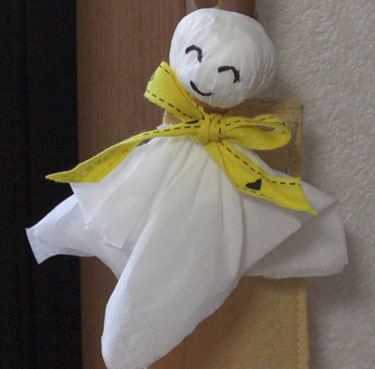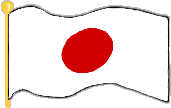てるてるぼうず
Martha wrote, "I am familiar with the song of Teru-teru-bōzu. It is an old Japanese tradition. That is: When it rains for many days and one plans to go for, let's say, a school outing, then one prays for a sunny day the next day. In this case, he/she would hang a hand made white doll called Teru-teru-bōzu at the eaves. Sometimes it works, sometimes not, but is a cute idea.
You might be interested in knowing what Teru-teru-bozu means. 'Teru' means sunny and 'bozu' means a Buddhist priest or a monk. Put together means: a paper doll to which children pray for fine weather."
Petter Mæhlum translated Teru-teru-bōzu as "Shining-shining-buddhist monk" but wrote, "but this is the name so maybe it is not translated?" [I did notice some people leave it as "teru-teru-bozu" instead of translating it.]
Ayako Egawa wrote from Japan, "In this song I think 'てる' means the sun shines and people pray for the nice weather. And the 'ぼうず' means monk. It is correct. But in this song it refers to the nickname for small boys. We Japanese can tell 'てるてるぼうず' is a boy. So if I translate the title, I can say 'Sunny sunny monk boy'."

てるてるぼうず
Sunny, Sunny Monk Boy
Children's Song
Children's Song
(Japanese)
(English)
てるてるぼうず、てるぼうず
明日天気にしておくれ
いつかの夢の空のように
晴れたら金の鈴あげよ
てるてるぼうず、てるぼうず
明日天気にしておくれ
私の願いを聞いたなら
甘いお酒をたんと飲ましょ
てるてるぼうず、てるぼうず
明日天気にしておくれ
それでも曇って泣いてたら
そなたの首をちょんと切るぞ
Sunny, sunny monk boy, sunny monk boy,
Tomorrow, make the weather nice for me
Like a heavenly dream once upon a time
If it clears, I'll give you a gold bell.
Sunny, sunny monk boy, sunny monk boy,
Tomorrow, make the weather nice for me
If you listen to my wish
We'll drink lots of sweet sake.
Sunny, sunny monk boy, sunny monk boy,
Tomorrow, make the weather nice for me
If it should get cloudy and you weep*
Then I'll cut off your head, Snip!**
Notes
*i.e. rain = make it rain
** Alternate translation, "Then I shall snip your head off." Martha wrote: "'Snip your head off' sounds so cruel. My personal interpretation is: the prayer [person praying] is so desperate to have a sunny day, so s/he used the threatening words to honor the wish [i.e. have the wish granted]."
I read on the internet that people don't usually sing the last verse... perhaps because it's not too nice.
*****
Romaji:
Teru-teru-bōzu, teru bōzu
Ashita tenki ni shite o-kure
Itsuka no yume no sora no yō ni
Haretara kin no suzu ageyo
Teru-teru-bōzu, teru bōzu
Ashita tenki ni shite o-kure
Watashi no negai wo kiita nara
Amai o-sake wo tanto nomasho
Teru-teru-bōzu, teru bōzu
Ashita tenki ni shite o-kure
Sorete mo kumotte naitetara
Sonata no kubi wo chon to kiru zo
*****
Song lyrics by Kyohson Asahara
Composed by Shinpei Nakayama



Thanks!
Thanks!
Thanks and Acknowledgements
Translated by Petter Mæhlum, Lisa Yannucci, Ayako Egawa and Martha Tseng. Thanks to Martha also for commenting on the tradition. Thanks to Ayako Egawa for the photos, for checking the translation and for helping to translate the name of the song. Thanks to Sadao Mazuka for the midi.
Arigato gozaimasu! 

























